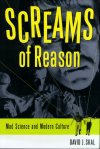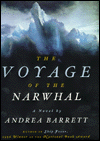USA Today's article, ''Horror's home run king bats again'', includes this passage:
If forced to choose between good storytelling and beautiful writing, he
says, he'd settle for a good story. ''So-called literary critics who praise
gorgeous writing without a story are like some guy dating a model,
saying she's dumb as a stone boat but is great to look at.''
The paper's review by Bob Minzesheimer appears today.
(Tue 22 Sep 98)
San Francisco Chronicle, Sunday Sept. 20th
A column by Michael Berry covers several SF/F works that ''display a wide range of wit, from laugh-at-loud funny to icily satirical''. Sean Stewart's Mockingbird (Ace) is ''a true tour de force, one of the best, most enjoyable books of the year.'' Avram Davidson's posthumous novella The Boss In the Wall (Tachyon Publications), completed by Grania Davis, is ''both a chilling horror story and a sly satire of academia.'' William Browning Spencer is ''a bona fide original, reminiscent of Jonathan Carroll in the ways he twists the mundane into the surreal and horrific'' but Irrational Fears (White Wolf) ''doesn't find him in top form''. Nancy Kress's collection Beaker's Dozen (Tor) features work that is ''overtly comic only occasionally'', but Kress ''does, however, have the keenness of vision that makes for formidable satire''. And Michael Marshall Smith's One of Us (Bantam) is ''a rickety roller coaster of a book, but there's no denying the fun of some of the plot's hairpin turns.''
(Tue 22 Sep 98)
 Newsweek, Sept. 21st
Newsweek, Sept. 21st
A feature article by Malcolm Jones Jr., subtitled ''Stephen King reinvents the Gothic romance'', reviews Bag of Bones, which hits the bookstores in the US next week. ''There isn't much about novel writing that [King] doesn't know by now, and when he decides to scare you, you know you've been worked over by a pro. But the big surprise here is the emotional wallop the story packs... [The book] contains some of his best writing, worthy of comparison at times to his idol, Shirley Jackson.'' The article includes this exchange about King's peers.
(Wed 16 Sep 98)
Entertainment Weekly, Sept. 18th
Geoff Ryman's 253 (St. Martin's Griffin), the hardcopy edition of Ryman's online novel, gets a paragraph review from Alice King. The ''print remix'' ''includes an index of links between characters, cheeky footnotes (William Blake makes a cameo trip to the present in a rambling note about the poet's home on Hercules Road), and subversive ads (BECOME AN AUTHOR IN YOUR SPARE TIME!) that remind the reader that however real a novelistic world may seem, it's still the creation of an all-powerful author.''
(Wed 16 Sep 98)
 Voice Literary Supplement
Voice Literary Supplement
Nicola Griffith's The Blue Place attracts favorable attention from reviewer Elizabeth Pincus, who remarks ''The Blue Place warps time as well as genre. It may be the first-ever nugget of post-gay pulp, with a hero as sexy and iconic as television's Xena."
(Wed 16 Sep 98)
Salon, Monday Sept. 14th
The webzine's ''21st'' feature by Andrew Leonard wonders what killed cyberpunk (answer: cyberspace) by way of reviewing two current examples, Alexander Besher's Mir: A Novel of Virtual Reality and Scott T. Grusky's Silicon Sunset: Where the Information Highway Really Leads. Leonard says ''Besher is a decent writer with some vivid ideas'' but the novel is lazy and full of stereotypes. Both books rely too heavily on contemporary Web realities. Grusky too has a great idea, ''reminiscent of the best work of Philip K. Dick'' but ''he writes in a flat, colloquial style that tends to cast his whole project under an amateurish light.''
(Mon 14 Sep 98)
The New York Times Book Review, Sunday Sept. 13th
 Dick Teresi reviews David J. Skal's Screams of Reason: Mad Science and Modern Culture and is not impressed. He likes Skal's use of contemporaneous reviews in discussions of movies like Frankenstein, but takes Skal to task for expressing deep thoughts about scientists based on pop culture. ''His negative judgments about scientists are based on movies and visits to Disney World, Universal Studios Florida (Robosaurus, a fire-breathing T-Rex robot, is his idea of Big Science) and sex shops.''
Dick Teresi reviews David J. Skal's Screams of Reason: Mad Science and Modern Culture and is not impressed. He likes Skal's use of contemporaneous reviews in discussions of movies like Frankenstein, but takes Skal to task for expressing deep thoughts about scientists based on pop culture. ''His negative judgments about scientists are based on movies and visits to Disney World, Universal Studios Florida (Robosaurus, a fire-breathing T-Rex robot, is his idea of Big Science) and sex shops.''
Also this week: Mavis Gallant reviews Jorge Luis Borges' Collected Fictions, ''the first complete translation into English of all the fictions, in a single voice'' by Andrew Hurley, a professor of English at the University of Puerto Rico. ''Some -- ''The Aleph,'' ''Emma Zunz,'' ''The South'' -- stand among the great short fiction of the century.''
 And there's a review of Andrea Barrett's The Voyage of the Narwhal, a historical adventure novel about an 1855 Arctic expedition. The central character is a naturalist and ''the whole novel takes place in the lee, as it were, of Charles Darwin's 'Origin of Species,' which would appear four years later but whose ideas were already in the air -- along with debates about slavery, racial superiority, the Irish potato famine and the young author Thoreau, whose books the ship's surgeon pores over on the voyage.'' Michiko Kakutani's Sept. 4th review cites the book's thematic links to ''Frankenstein'' and ''Moby Dick'' and its description of the polar region that recalls Barry Lopez and ''the metaphysical landscape of Poe's 'Narrative of A. Gordon Pym' ''.
And there's a review of Andrea Barrett's The Voyage of the Narwhal, a historical adventure novel about an 1855 Arctic expedition. The central character is a naturalist and ''the whole novel takes place in the lee, as it were, of Charles Darwin's 'Origin of Species,' which would appear four years later but whose ideas were already in the air -- along with debates about slavery, racial superiority, the Irish potato famine and the young author Thoreau, whose books the ship's surgeon pores over on the voyage.'' Michiko Kakutani's Sept. 4th review cites the book's thematic links to ''Frankenstein'' and ''Moby Dick'' and its description of the polar region that recalls Barry Lopez and ''the metaphysical landscape of Poe's 'Narrative of A. Gordon Pym' ''.
(Mon 14 Sep 98)
Boston Globe, Wednesday August 26th
Robert Taylor reviews Gillian Bradshaw's Island of Ghosts, an historical novel about the Sarmatians, a barbarian 2nd century tribe fighting Roman legions. (Bradshaw is best known to genre readers as author of an Arthurian trilogy.) The reviewer praises the author's deft balancing of tribal values against Roman laws and customs and the book's focus on character, giving the ''historical novel a rare and unusual depth''. (The review is archived and is accessible only for a fee.)
(Mon 14 Sep 98)
CNN, Wednesday Sept. 9th
David Mandeville pans David Farland's [Dave Wolverton's] The Runelords. Mandeville says the fantasy notion of runes is interesting, but he finds the plot first predictable then nonsensical, and gives examples. ''I started disbelieving around page 17.'' He concludes (ironically) ''Farland has a great deal of potential. I'll just say that 'The Runelords' reads like a trunk novel that should have been published long after he became famous rather than as a first effort.''
(Wed 9 Sep 98)
The New York Times, Wednesday Sept. 9th
Richard Bernstein reviews Jorge Luis Borges' Collected Fictions.
(Wed 9 Sep 98)
Popular Science August 1998
A short story by David Brin, ''Life in the Extreme'', is the first in a series in which the magazine asks SF writers to envision life in the next 100 years.
(Wed 9 Sep 98)
CNN, Thursday Sept. 3rd
Jim Argendeli reviews Stephen King's Bag of Bones and is not disappointed: ''a classic ghost story which should keep
his old fans elated and cause others to understand why the man from Maine
still has the born storytelling ability to keep us enthralled.
(Fri 4 Sep 98)
The New York Times Book Review, Sunday August 30th
Gerald Jonas's science fiction column covers four books, all notable for their female protagonists, though otherwise variously successful. He likes Sean Stewart's Mockingbird best; Stewart ''writes about magic as if it were an everyday occurrence''. Matt Ruff's Sewer, Gas & Electric is a talky, picaresque novel that takes cues from Ayn Rand. J. R. Dunn's Full Tide of Night starts well but deteriorates into a ''slow-motion confrontation between Good and Evil. Guess who wins.''. And Alexander Jablokov's Deepdrive is complicated but colorful. ''You can think of this novel as 'Men in Black' with a female lead, played straight. But Jablokov's aliens are definitely not from Central Casting...''
(Fri 4 Sep 98)
 San Francisco Chronicle, Sunday August 30th
San Francisco Chronicle, Sunday August 30th
Ernest Callenbach reviews David Morse's The Iron Bridge, an unusual time travel novel in which an attempt to redirect the future focuses on an 18th century iron bridge in England. Callenbach is impressed on several levels, e.g. ''Morse deploys social history skillfully, giving us a vividly painful sense of what growing industrialization meant'', and though Morse's ''commitment to history drives him to evade the logical contradictions of the time-travel genre instead of embracing them'', his treatment of historical forces is provocative.
(Fri 4 Sep 98)
Washington Post Book World, Sunday August 30th
This month's science fiction column is by David Streitfeld. Psychoshop, the posthumous Bester/Zelazny collaboration about ''the same old magic shop-motif that has been replayed many times in sf'' doesn't reflect the best of either author. ''The characters aren't developed enough to warrant being labeled cardboard; when the appearance of God rates only a yawn, it's a sign that a novel is in trouble.'' Nalo Hopkinsons's Brown Girl in the Ring ''has the usual first novel faults in pacing and plotting but more than compensates with its richness of language''. Also covered: NESFA Press's C. M. Kornbluth collection, and Jim Turner's anthology Eternal Lovecraft: The Persistence of HPL in Popular Culture.
(Fri 4 Sep 98)
Previous Field Inspections


 Voice Literary Supplement
Voice Literary Supplement Los Angeles Times, Sunday Sept. 22nd
Los Angeles Times, Sunday Sept. 22nd Newsweek, Sept. 21st
Newsweek, Sept. 21st Dick Teresi
Dick Teresi  And there's a
And there's a  San Francisco Chronicle, Sunday August 30th
San Francisco Chronicle, Sunday August 30th